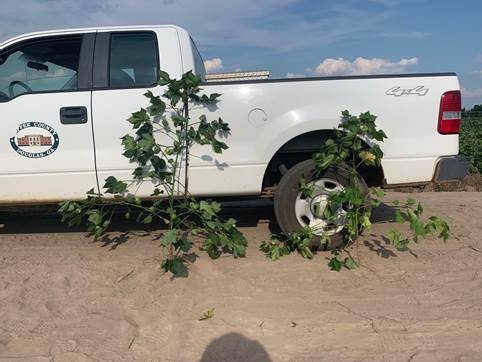Issues and questions surround cotton production
By John McLemore
University of Georgia Extension Service
As we approach the middle of August growers statewide are experiencing problems with cotton growth.
During Dr. Glen Harris’s county visit, he assessed cotton fields on the Deen (Coffee County grower) and Corbitt (Atkinson County grower) family farms. Dr. Harris is the, UGA Extension Agronomist for Environmental Soil and Fertilizer. During our visitations we saw reddening in the petioles and stems, stunted plants, and plants showing nutrient deficiency. Dr. Harris concluded that the issues we are seeing are related to extreme heat from mid-May to the beginning of June causing stressful growing conditions. These growing conditions affected plant root growth which impacts plant nutrient uptake.
A single foliar application of potassium nitrate could help improve the nutrient levels in the plant; however, it is not guaranteed. According to fertilizer application timing research conducted by Dr. Harris, foliar application from the third to the eighth week of cotton bloom is ideal. Beyond the eighth week foliar application benefits are minimal. Dry fertilizer application beyond the third week of bloom may provide nutrient benefits, but not likely because the fertilizers need an adequate amount of time to undergo mineralization before being plant available. Foliar fertilizer application is recommended by Dr. Harris because once a cotton plant reaches the third week of bloom the plant places its energy into boll production, not root production. Therefore, since the plant is placing its energy into boll production instead of root production, the plant can only effectively utilize foliar fertilizer applications to minimize plant nutrient deficiency.
In the future, to minimize plant nutrient deficiency I suggest routine in-season soil and plant tissue sampling. This service is available through at your local UGA extension office or co-op. Remember, when applying lime or dry fertilizer a large amount is not plant available. The fertilizer needs time to break down (mineralize) to become available for plant uptake. For more information, contact your local extension office.
The University of Georgia Extension and Coffee County ANR extension program is committed to helping the community move forward, and continue to be of value to the community as much as the community is of value to UGA extension. Coffee County ANR extension agent can be reached by email (john.mclemore@uga.edu) or office phone (912-384-1402).







